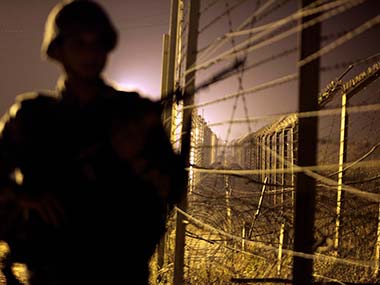Let’s have a war. Pakistan deserves it. More importantly, the most important voices of the people — the opposition parties and the media — want it. The government has no business to be in the way of popular will. If it does, it is an anti-national government. Niceties of diplomacy can wait. How ridiculous can it get! There must be some sense of proportion in the way we react to every act of aggression from across the border. For all we know, this could be a deliberate effort from vested interests to stall any initiative towards improving Indo-Pak relations. If anyone bothered to notice, these incidents hog headlines and generate a lot of heat, particularly in India, just before bilateral talks are set to begin or are just over. Someone knows well how to set a trap and we manage to walk right into it. [caption id=“attachment_1023783” align=“alignleft” width=“380”]  The killing of Indian soldiers is a dastardly act. But the Indian Army has the option of tit-for-tat response on a local scale to the attacks on its personnel from across the LoC. AP[/caption] The killing of Indian soldiers is a dastardly act. But the Indian Army has the option of tit-for-tat response on a local scale to the attacks on its personnel from across the LoC. In fact, Army Chief Bikram Singh, responding to the beheading of Indian soldiers in January, had said that India would retaliate “at a place and time of our choosing” and asked the commanders to be aggressive in the face of firing. There is no reason to believe that this counter-attack option is not being exercised. However, the military option could stay separate from the diplomatic efforts at building long-term peace. It’s not easy when the country’s soldiers are being killed and there’s a public outrage. But there’s a line between genuine outrage and display of competitive jingoism. The latter becomes particularly worrisome when people involved are aware of the delicate nature of diplomacy in general and in the context of Indo-Pak relations in particular. The knowledge of the turbulent geopolitics of the region and the trouble potential of many of the players should make them sober. Everyone who matters or wants to matter has been demanding a strong response from India to the attacks. However, the details of the ‘strong response’ is hardly spelt out. One of the BJP spokespersons put that specific question during television panel discussion. Whatever we get as ‘strong response’ elsewhere is wishy-washy. Everyone knows Pakistan is a difficult country to deal with what with no control of the civilian government over internal security and foreign policy matters. Everyone concerned realises peace, not war, is in India’s interest as its focus is on economic growth and it’s best to keep localised conflicts localised. The country has responded well to wider military aggression from Pakistan four times and it has the capability to hit back again. War is insinuated in every reaction to incidents on LoC, but never mentioned loud and clear. If this is really the ‘strong response’ the whole country wants - that is what the talking class would have us believe - then there is no point in the government holding back. When public opinion drives diplomacy, it is a sorry state of affairs indeed. Peace talks - relation normalisation efforts would be a more appropriate expression - does not mean farewell to arms. Moreover, such talks could be an instrument of covert aggression too. Unfortunately, jingoism has the tendency to overshadow nuanced thinking. And whose interest do such reactions serve in reality? It is the very characters who have a vested interest in sabotaging any normalisation move. The major players behind the incidents are no secret. The Pakistan army and its intelligence wing - ISI - have been using state and non-state players to keep the India-Pakistan relationship unstable. A situation of instability helps them retain respect and trustworthiness among the core constituency of hard-core Islamists, a non-homogenous bunch with their own set of grievances against the world. Pro-Kashmiri outfits are among them. If there’s normalisation of relationship between India and Pakistan and there’s more people to people contract courtesy trade and other economic activities, it would enhance the credibility of the civilian government. It would also means gradual erosion of the moral authority of the army and sway over its core support base. Thus it has to keep things unstable on the India front. And what better way to do it than raising anti-Pakistan passion in India? This partially explains the LoC incidents at strategic intervals. It’s a trap we walk into every time. The Pakistani government offers no hope. But it’s in India’s interest to keep it engaged. By withdrawing from normalisation initiatives, it would only be strengthening the real culprits. Let’s just trash this war talk.
India must resort to the localised military option when provoked, but it must not be at the cost of diplomacy.
Advertisement
End of Article


)

)
)
)
)
)
)
)
)



